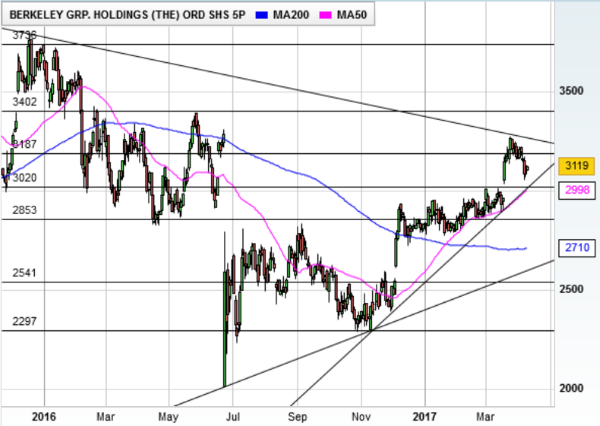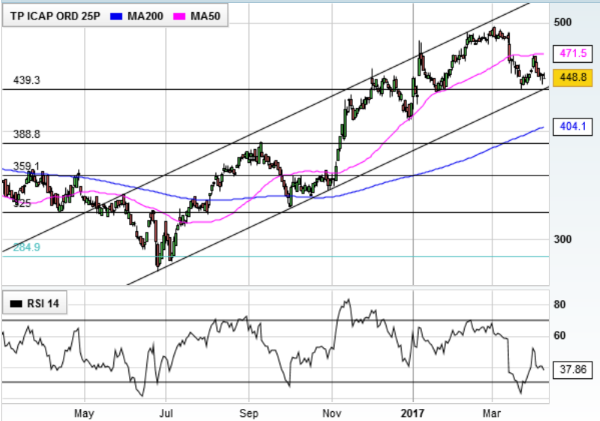Insider: A £31m seller and a trader's 'buy'
7th April 2017 13:16
by Lee Wild from interactive investor
Berkeley Group man's house full of cash
Like every other UK-listed housebuilder, was hit hard by last summer's Brexit vote. Talk of a housing market crash, starting in London, caused fear among investors sitting on handsome profits made from the post-Credit Crunch recovery.
But those concerns have proved wide of the market and, while the capital's booming residential property sector has certainly cooled, demand remains high elsewhere and prices are holding up.
Berkeley lost as much as 40% of its value in the aftermath of the EU referendum, but equities, especially the high-yielding kind, are still a big draw given UK interest rates are unlikely to rise until 2018 at the earliest.
And last month's optimistic trading update proved the catalyst needed to finally drag Berkeley's share price back to its pre-Brexit vote level.
With the housing market in London and the South East having stabilised, enquiry levels remain "robust", cancellation rates are at normal levels and pricing is resilient and above business plan levels. Pre-tax profit for the year ending 30 April 2017 will be at the top end of analysts' expectations.
But despite such optimism, chairman and major shareholder Tony Pidgley has decided now's the time to make one of his customary share sales.
He's just netted £31 million after offloading 1 million shares at £31 each. That's over £10 million more than he'd have got for them nine months ago!

Pidgley, who set up the company in 1976 and moved from managing director to chairman in 2009, has picked up substantial bonus shares over the years. So, even after selling his stake in the £4.3 billion business to below 4%, he still owns almost 5.3 million shares, plus a little over 215,000 held indirectly, worth an eye-popping £171 million in total.
However, shareholders need not fear. Pidgley's trading activity has rarely been a great indicator of future share price behaviour. Much of that is to do with his enormous stake in the company, with fairly regular sell orders not uncommon among such significant owners, and not just at Berkeley.
While it's impossible to know with any confidence what Brexit negotiations will bring, recent history tells us that domestic plays like the housebuilders will struggle if talks go badly.
TP ICAP likes OTCs
Once upon a time there were two interdealer brokers called Tullett Prebon and ICAP. They had done well, but times were changing.
Tighter regulation meant big investment banks were using the so-called over-the-counter (OTC) market less and less. That hurt business at firms like Tullett and ICAP who acted as middlemen on huge deals done in private rather than on an investment exchange.
And, in 2015, record levels of issuance of corporate and government bonds also raised concerns around liquidity. Then, just weeks after Tullett had issued a profits warning, it confirmed it would pay over £1.1 billion for ICAP's global voice broking business.
Now, three months after deal done completed, Tullett has become and ICAP has become .
Both have done well since the ink dried, but NEX has done significantly better. In 2017 so far, NEX shares are up 23%, but TP, which had risen as much as 17% in the aftermath, is now up just 6%.
That's perhaps why TP chiefs have been snapping up stock. Shortly after last month's full-year results, finance director Andrew Baddeley spent £76,000 on 17,000 TP shares at 447p.
And this week, chief executive John Phizackerley, who's run Tullett since 2014, has raided his vast piggy bank to buy 151,964 shares at 455p, costing over £691,000.

Annual results on 14 March were decent enough and followed a stronger-than-expected update in January. But they couldn't prevent the shares drifting lower. Some were disappointed with slightly higher costs, which nibbled away at operating profits, and the shares do currently trade at "peak" PE multiples of 12-13 times.
TP needs more aggressive cost savings – investors want more than the £80 million by 2019 and £100 million by 2020 already announced – and greater volatility in currency interest rate markets to win over the doubters. There could also be a read-across if Donald Trump does water down the Dodd Frank Act, forcing European Regulators to follow suit.
This article is for information and discussion purposes only and does not form a recommendation to invest or otherwise. The value of an investment may fall. The investments referred to in this article may not be suitable for all investors, and if in doubt, an investor should seek advice from a qualified investment adviser.